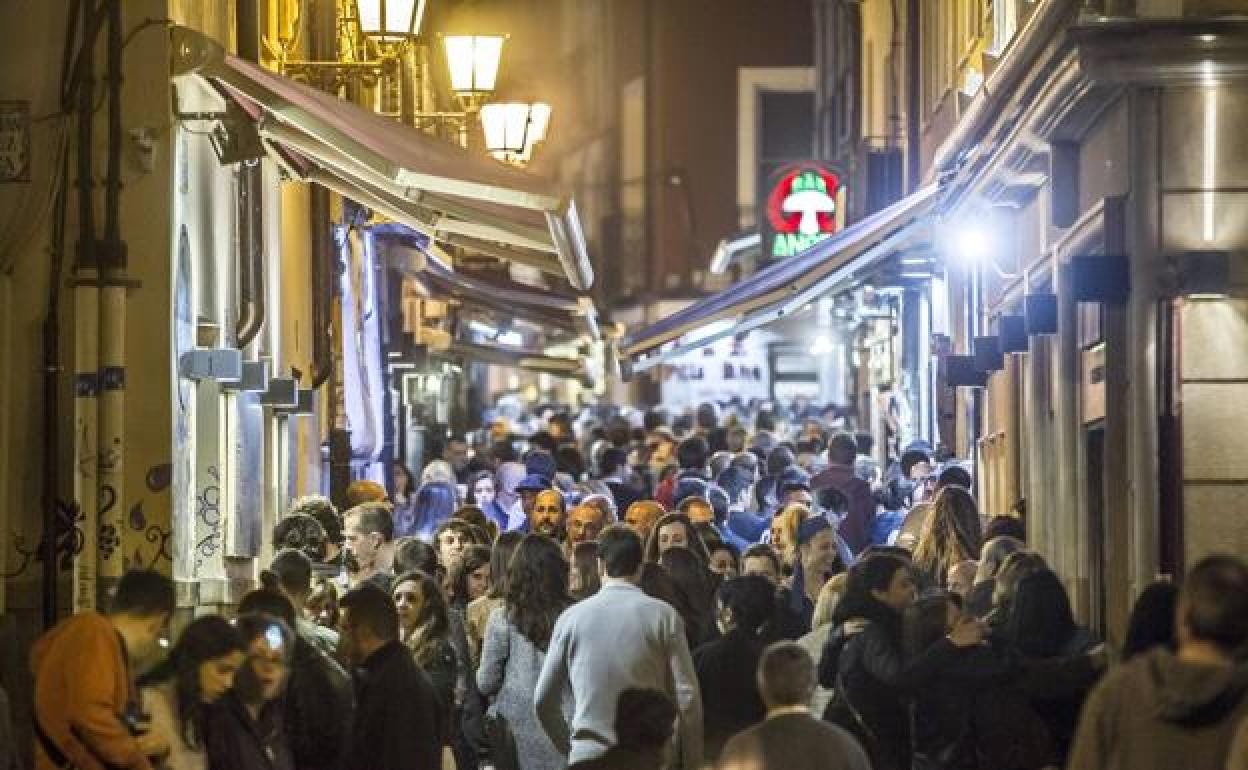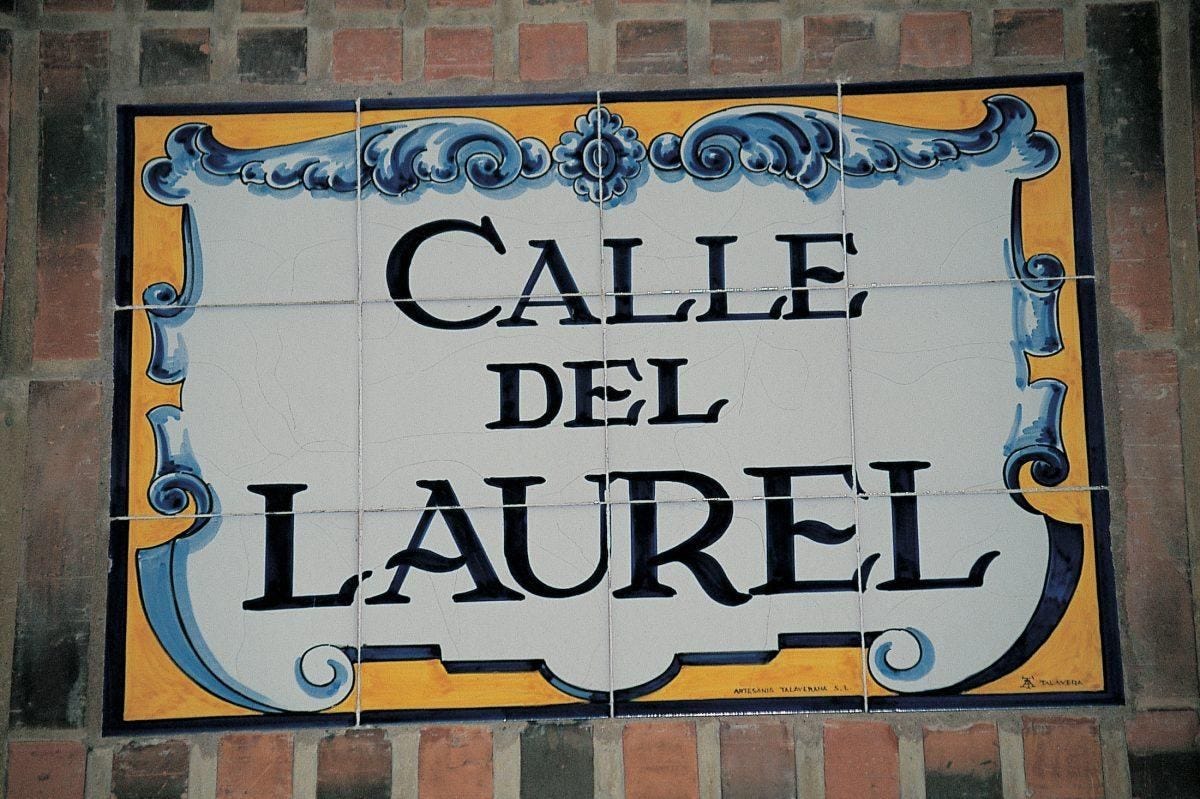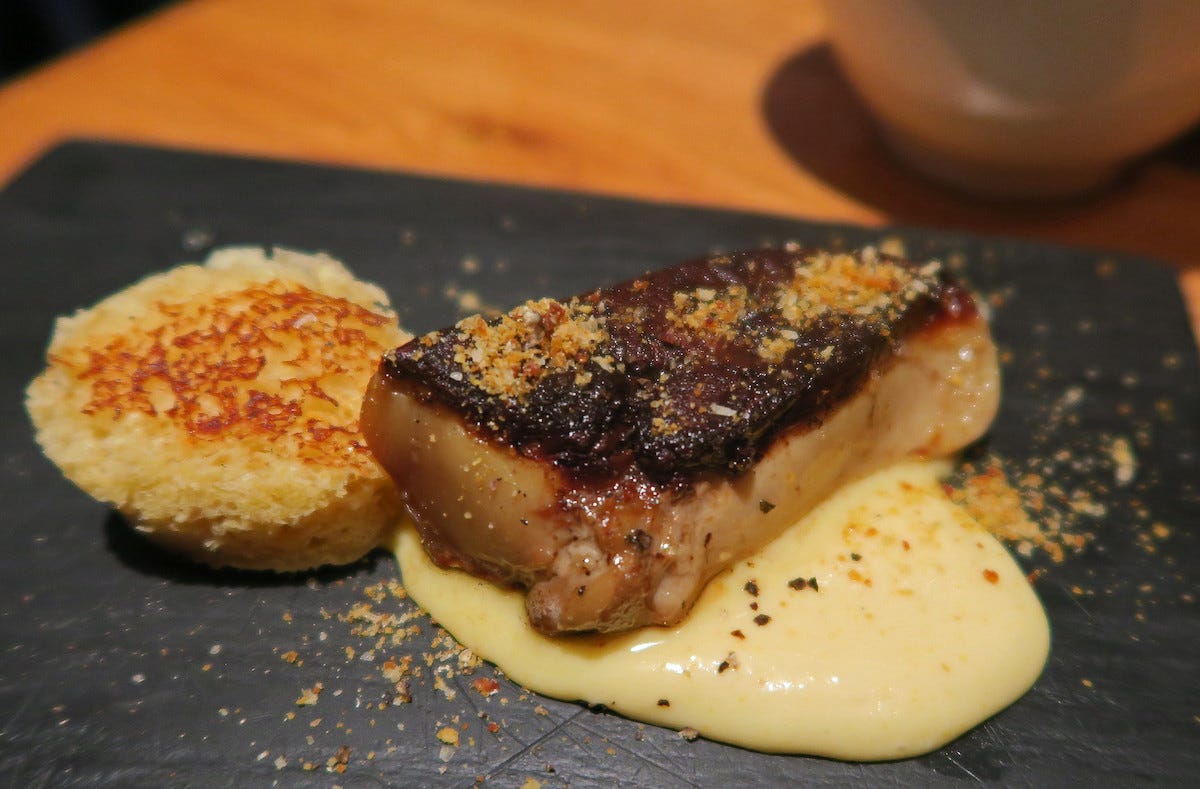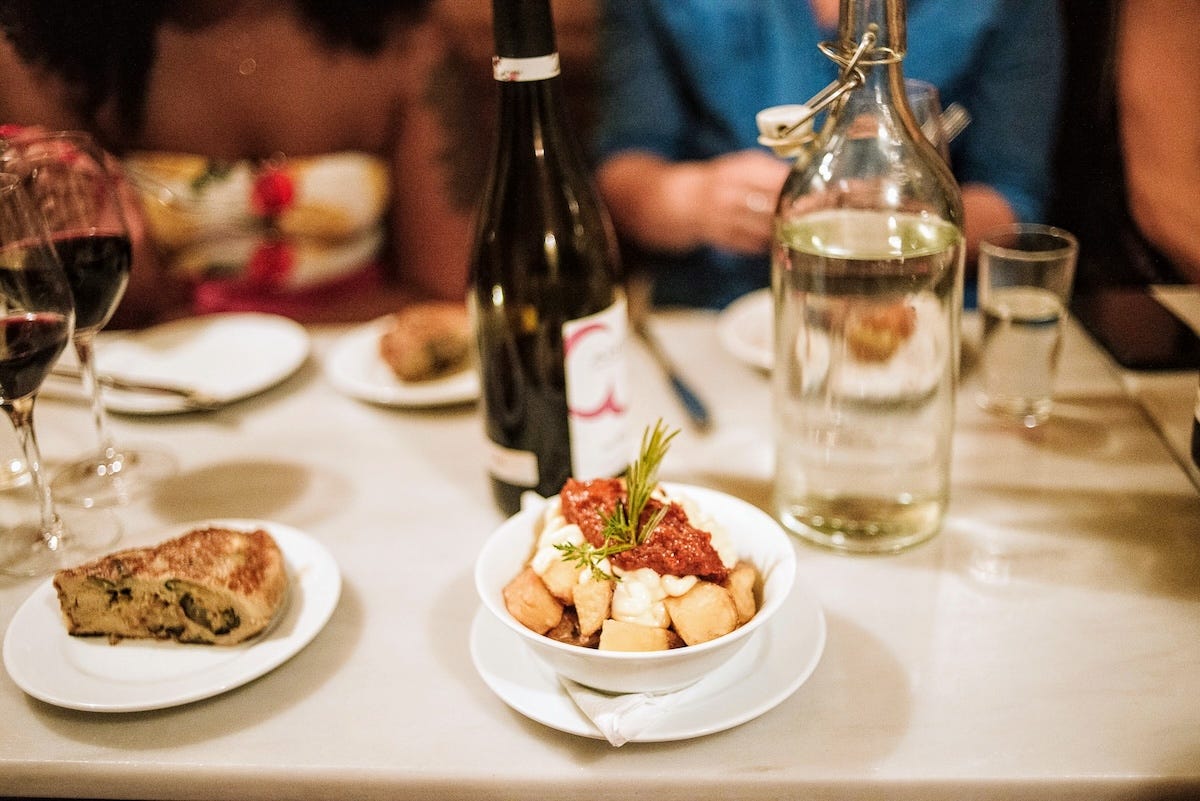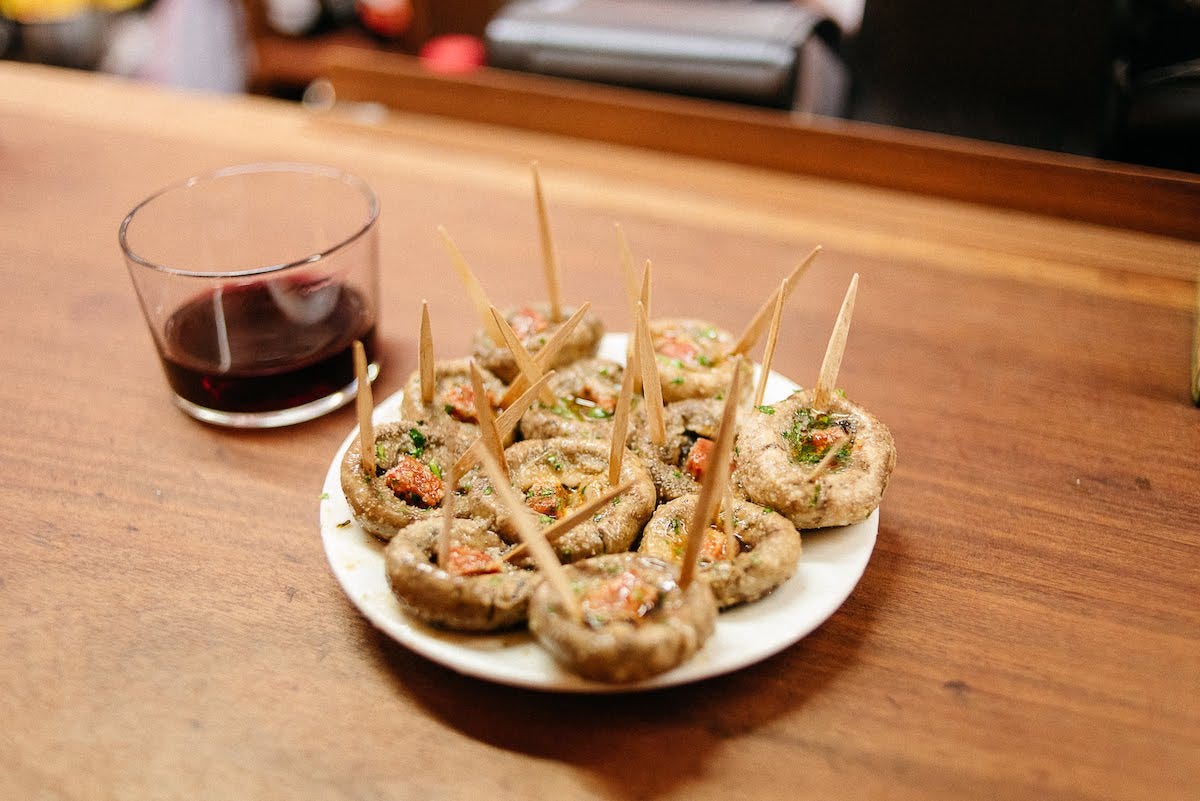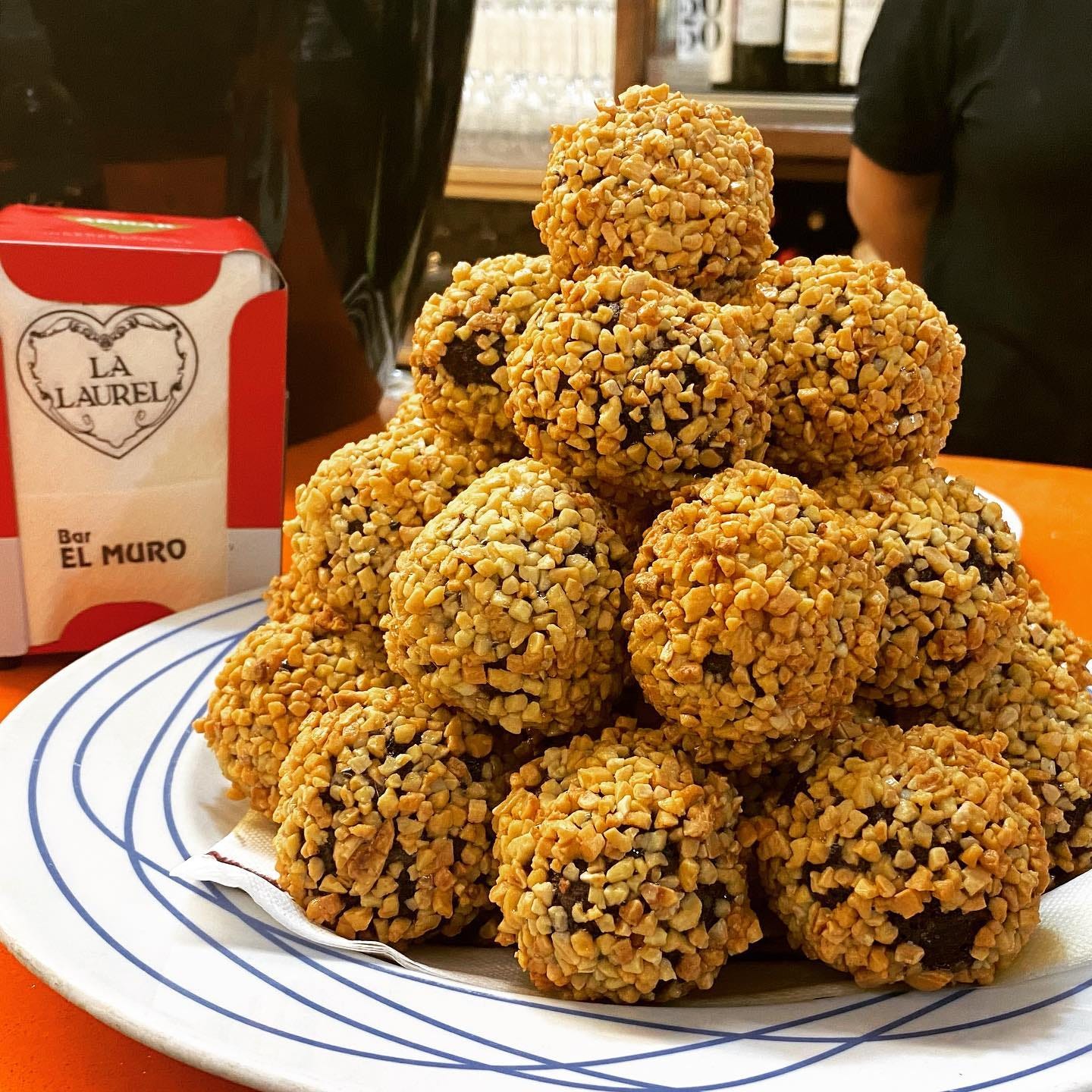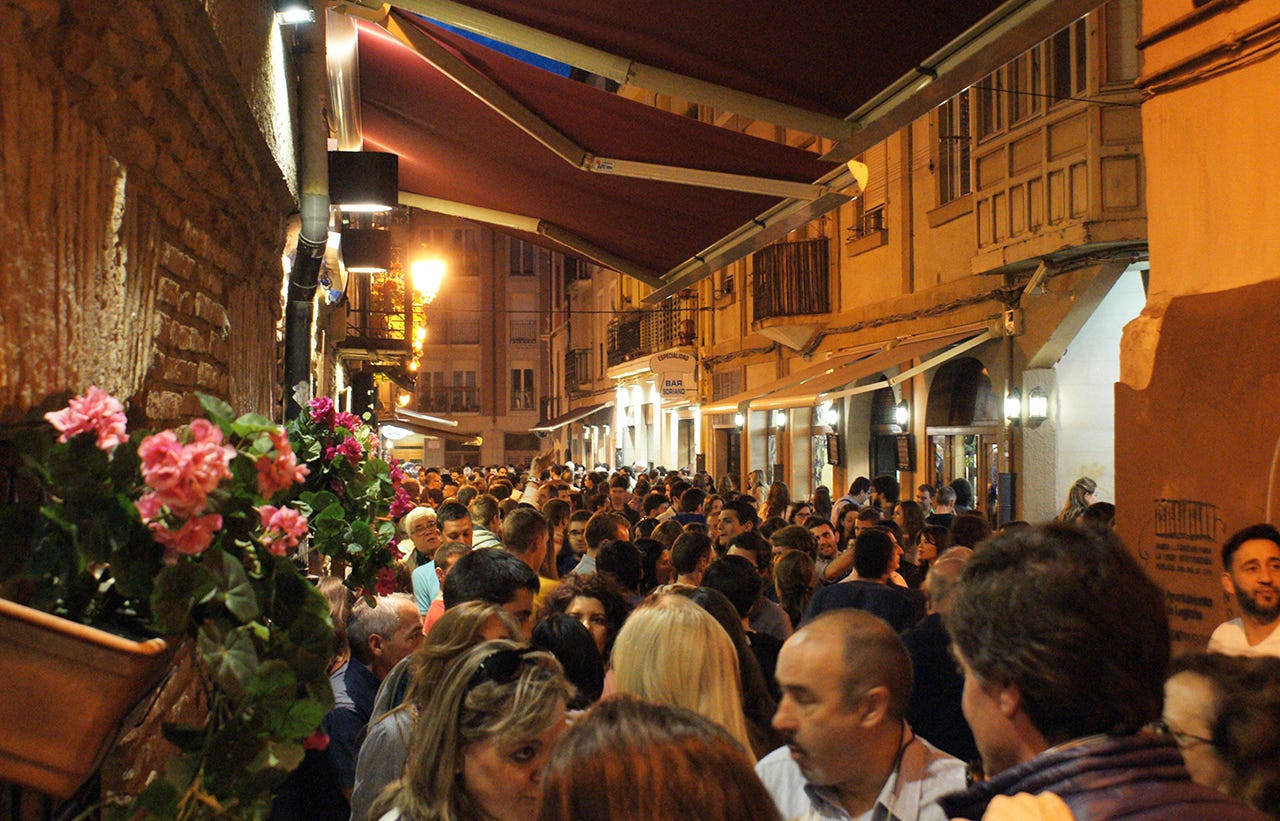A Night Pinchos and Vino on Logroño’s Calle del Laurel
It was just one of those ultra rare, perfect moments that didn’t need to be posted, tagged, or even remembered clearly. It just needed to be lived.
If you’ve ever wondered what it would be like to live in a painting by Goya, but with the soundtrack of the Rolling Stones, throw in the scent of frying garlic and tomatoes thick enough to stay with you for days, then Calle del Laurel in Logroño is your kind of place. Some people go to church in search of transcendence. Others may try therapy to find their path or to understand themselves. For me, it’s all about the experience. Give me a narrow Spanish street after dark, packed from one wall to the next with locals and travelers from nearly everywhere, the sound of music and languages bouncing off of the stone walls, the smell of oak and wine slowly drifting in the air, the sound of laughter reverberating around me, and the promise of pinchos to soak up everything else that you could ever think of. But here’s the kicker. If you’re lucky, you would share this experience with a few friends, the kind who bring their own stories and appetites along for the ride. If you’re really lucky, then they just happen to be a Michelin Star chef and a world-renowned winemaker from Ribera del Duero. A chef with hands that have cracked open lobsters in three continents, and a wine-making sommelier with a nose that twitches every time he hears someone pop open a bottle. But even if you walk the crowded venue alone, as the culture here would have it, even the shy and the apprehensive quickly meet new people, all squeezed together for an evening out that was truly an unforgettable experience, no matter how many times you do it.
For this evening, both of my friends have requested anonymity for this adventure, not for any other reason except that they were supposed to be working tonight. My chef friend jokingly mumbled something about NDAs and “the less Instagram, the better..” My winemaker friend just winked and said, “Just don’t tell my wife I am out with you two maniacs tonight.” The reasoning was logical and fair enough me. After all, names didn’t really matter on Calle del Laurel anyway. Here, we’re just hungry travelers, elbow to elbow with locals, tourists, and the ghosts of a thousand hangovers past. All pressed together, drinking, laughing, eating and sharing an evening together that you could only experience here, in a country like Spain.
Bar Donosti: Foie Gras Is the Meaning of Life
We started our evening squeezing into Bar Donosti, because if you’re going to go hopping from one bar to another, this was the way to begin. Bar Donosti was the sort of place that felt like a local secret, even when it was packed to the gills with patrons actually spilling out into the street. We squeezed in tight, so tight that you might as well get the number of the strangers pressed in around you. I sat with my back against the wall, my chef friend already craning his neck over the counter, eyes brighter than a kid waiting for his ice cream cone. As every bar had a full menu and a specialty, that special item on the menu here was foie a la plancha—grilled foie gras on toast, with a dab of lavender petal jam. Now, before you clutch your pearls and start muttering about the sheer horror of foie gras, let me just say that you haven’t lived until you’ve tasted the unholy union of seared duck liver and perfumed sugar. It’s a combination on a plate that makes you question your moral compass and your cardiologist’s advice in equal measure. I stare wide-eyed at the chef who took a bite and nearly inhaled his pincho, closed his eyes, and muttered, “De rechupete.” Seriously high praise, considering he just said that this was so good, that he would lick the plate clean. Unless my Spanish slang was rusty, but somehow, I felt like I hit that mark on my translation gauging his facial expression.
We ordered a pairing of a few glass of something red and dangerous from Rioja. An easy choice considering the richness of the foie gras. I took a sip as my winemaker friend swirled and sniffed, swirled and sipped. But it was that goofy grin that spread from one cheek to the next that really told the tale. “Not bad,” he stammered, which in winemaker speak meant, “I’d drink this alone in my bathtub with the door locked.” We ate, we drank, and we watch the crowd ebb and flow like human waves across the room and the along the street. Old men in pressed shirts, young women in impossible heels, gaggles of students, all pressing forward. All of them here, happy, and hungry for something truly extraordinary. The girl standing behind me, using me for support, dressed in a leather jacket kissed her boyfriend hard, shoving me forward and making me gulp my wine. We all laugh as I provided the stability for the impromptu affection, and we all turned to watch her drag him off toward the next bar. Two old women laughed over a plate of anchovies and olives while they sipped their Albariño. All you could see, no matter where you looked, there were people that didn’t eat to live. Rather, they lived to eat. They lived to drink. And the definitely lived to flirt shamelessly with strangers.
Bar Jubera: The Gospel of Patatas Bravas
I barely managed to shove my foie gras pincho into my mouth and polished off my first glass of wine before chef was tugging at my sleeve, pointing to the next destination. The noise was deafening as it bounced off the stone walls, but I didn't need to read lips or hear him when I saw him mouth: “Bravas?!” It was less of a question, and more of a command. On Calle del Laurel, you never said no to bravas. Well, in Spain, you generally never said no to bravas.
We piled into Bar Jubera like a bunch of punk rockers jumping into a crowd, stage diving into a mosh pit of wine and food. Bar Jubera was a shrine to that most delicious and most elegant of Spanish foods—fried potatoes smothered in aioli and spicy sauce. The place was loud. It was bright. And as we all inhaled deeply, we grinned liked mad hyenas. The entire bar smelled like heaven, if heaven was a deep fryer. We grab a small table that was just liberated by a group of people headed out to another bar (go figure), wedged ourselves between a smattering of English tourists and a couple of old guys arguing about something that no one could hear. The chef knew the bartender and put in an order of potatas bravas, that arrived so fast, that he barely had time to lower his outstretched arm. They were golden cubes of fried goodness, stacked high, crusty layer on top of crusty layer, as the sauces dripping down like some impressionist painting of cholesterol and addiction.
Everyone in Spain always claims their bravas are the best. And sadly, everyone was wrong except for the people at Bar Jubera of course. The chef snorted, “Está de muerte,” and our plate is empty before anyone else got a second bite. The winemaker wiped sauce from his chin, shrugged, and said, “Espectacular.” Yes, these bravas WERE most certainly “to die for.” Yes! These bravas were spectacular. Which is exactly what you wanted from bravas—no foam, no deconstruction. Just honest, greasy comfort, crunchy potatoes, slathered in goodness. Which is why I pointed to my plate and told chef to immediately get a second order, due in part to his inhaling the first plate. I was not leaving Bar Jubera without greasing my arteries, at least with an additional serving.
The greatest thing about Spanish bars was that you don’t sit in splendid isolation, minding your own business. You made friends. Whether you wanted them or not. You got to know everyone around you. The people pressed into you. The people next to you. And sometimes, the entire bar, before you went on to the next one. Suddenly, between pinchos and vino tinto, everyone knew everyone else's business. The couple next to us was from Bilbao, and was in town for a wedding. There was a teacher from Zaragoza who insisted we try the vermouth. While chef and I passed on the offer, the winemaker definitely dipped his nose in for a glass. Soon, our small table was a mess of plates and stories. Everyone swapped bites and bullshit as laughter and mayhem ensued. My Spanish was in good use that evening, and while I might not know a word of Basque, the language of fried potatoes and amazing Spanish wine was always universal.
Bar Soriano: The Cult Of The Mushroom
Hopping from one bar to another, you tend to build a following. Especially when you engage with your neighbors. By the third stop, we had acquired a small entourage of satiated and inebriated people. But like a rock rolling down a very steep hill, bar-hopping on Calle del Laurel picked up speed and able bodies as we pounced into Bar Soriano, a local favorite around the corner on Travesía del Laurel. “Best mushrooms in Spain,” yelled the chef, in English no less, who now seemed to be leading our rag-tag, merry bunch of misfits. I raised an eyebrow, but winemaker just laughed. Bar Soriano was tiny, loud, and packed. Just as expected, the aroma in the bar was severely intoxicating, making me an instant believer of “Love At First Smell.” I inhaled deeply as I read the sign on the wall: “In Paris, the Eiffel Tower; In Rome, the Vatican; And in Logroño, the mushrooms of Soriano.” Modesty isn’t really a Bar Soriano kind-of thing.
However, they had complete bragging rights. The pinchos here were a thing of sublime beauty and utter simplicity. Thick, fat mushroom caps, grilled until their edges char, stacked atop a slice of baguette, doused in garlicky oil, and skewered with a toothpick. The mushrooms were meaty, almost steak-like. The bread soaked up the juices in a way that made you want to mock all the sad, dry toast you’ve eaten in your life. If you ever wanted to tell someone you were addicted to “shrooms,” these would be the ones that you should reference. We ate standing up, pressed against the bar and against each other. Chef licked his fingers obsessively. Winemaker couldn’t get enough and ordered another one just because he didn’t want to share. I knew he was eyeing a bathtub somewhere along the route to hide himself with his pinchos and a bottle of vino tinto.
The crowd from Bar Jubera followed us, and seemed to grow as we ate, drank and walked. Suddenly we were a roving mob, united by booze, bravas, and a shared love of things cooked in butter and oil. The street outside remained that impenetrable horde of people, all packed together as travelers had to swim through a river of bodies, young and old, all pulsing to the same beat. There was an electricity in the air. Vibrant, fun and loud. Aromas of every pincho on the street floated right and left, drawing in one crowd, and then another, and then another. Every door, every bar entrance held another specialty. Another delicacy. Another miracle on a plate.
Bar El Muro: Where the Wall Fell and Morcilla Begins
Eventually and inevitably, we strolled into Bar El Muro. We were a pretty happy bunch, laughing, chatting, and just a bit tipsy. The bar’s name meant “The Wall.” It opened in 1989, right around the time the actual Berlin Wall came crumbling down. There was something poetic about it. It was a place built on division, but was now a sanctuary for the united nations of drunkards, foodies, and accidental philosophers, all meandering in to collectively have a fucking good time. Inside, it was awe-inspiring, awesome, sublime chaos. The air was thick with the scent of wine, sweat, and sizzling sausage that sent puffs of smoke out through the bar and into the street. It was a siren song to the travelers that walked by and were lured in by the fragrance of meat. The walls were covered in photos, old concert posters, and scribbled graffiti. It was the kind of place where you could lose your euros, your dignity, and your heart in the space of about an hour. All in the best way possible.
We ordered the house specialty: Ferrero Rocher de morcilla. “What is that?” You may ask. Imagine a tennis-ball-sized orb of blood sausage, crusted in crushed peanuts, masquerading like a demented bonbon from the inebriated masses. Winemaker raised an eyebrow and raised his glass. Chef just grinned. Meat. We dug in with forks, the morcilla rich, spicy, and oddly sweet from the smattering of peanuts. It was the sort of dish that perhaps would never make it past the judgmental eye of a Michelin Inspector. It didn’t matter. Because here, in the chaos and noise of this crowded, amazing bar, it was fucking perfect.
I struck up a conversation with two new friends who had tagged along for the ride from one, or perhaps two bars ago. I wasn’t sure as the wine was clearly having the right effect. They were both recent Berlin transplants. They told stories of their childhoods to our motley group. Their memories of watching “The Wall” come down in real life as we matched it to our memories of seeing the same thing on grainy TV screens in our homes. Everyone in our group was suddenly silent, as these two amazing people described the sudden rush of freedom and fear that they both felt in a world that had suddenly turned upside down for both of them. “We didn’t know what would happen,” one says, “but we knew it was going to be different.” We all raised our wine glasses and toasted to the fall of The Wall. And to places like Bar El Muro—the strange and beautiful place where people came together over food and drink to become acquaintances and at the end of the evening, the very best of friends. Winemaker ordered and popped a bottle of Ribera del Duero Tempranillo—the good shit. There were pours, toasts, sips, a muddle of Spanish, German, and English. And maybe a little Basque thrown in for good measure as well. To new friends. To new adventures. To old walls. To mushrooms. To foie gras. To the best fucking bravas. To the particular magic of a Spanish bar, on a street packed with them, and people, all out on a Friday night.
The Gospel According To Logroño
By midnight, Calle del Laurel was a living organism. It pulsed with voices, clinking glasses, infectious laughter, and the smell of things sizzling on grills in kitchens. Chef was arguing with a local about the best way to make a real Spanish tortilla. Winemaker was teaching a group of American students how to swirl and taste wine without looking like a complete pompous asshole. And me, I was just sitting here, grinning like an idiot. Mostly, I was grateful to be here, with my friends; and a little drunk to be honest, in a place where food was love and strangers become friends over a plate of mushrooms and a splash of Rioja. There was nothing exclusive or precious about this moment. There were no velvet ropes. There was no dress code. This was just the honest, messy joy of eating and drinking together in a place where this type of evening was the norm.
What’s next? Let’s not kid ourselves. In Logroño, “What’s next?” Was not a question. Rather, it was a way of being. Calle del Laurel doesn’t wind down. Instead, it ramps up. The throngs of people were a constant roll up and down the busy street. My senses were hammered in the best possible way. My teeth were stained with the best vino tinto. My belly was full of pincho after delicious pincho. The night was young. I was surrounded by friends—old, new, and the ones whose names I probably will never remember. But their laughter will echo in my brain forever.
So, what’s next? Well, here’s how I think that it should go.
Don’t stop, just keep moving. Maybe veer off into a side street for a final copa at a tiny bar run by a guy with a handlebar mustache and a cellered collection of old Tempranillo. Grab a pincho with friends. Grab another. And then, another, promising yourself “just one more.” Tumble into a plaza with a pack of friends and strangers, and listen to someone start singing. And then, listen to everyone join in. And no one cared about the words or the tune because it was honestly just the glorious feeling of belonging. If you’re lucky. If you’re really lucky, you’ll end the night somewhere at your last bar stop, at a table outside, the city lights shimmering above. Chef’s eyes were drooping, but he really wanted to polish off the last swig of vino tinto straight from the bottle. Winemaker was swirling his glass, still talking about tannins at this late hour. It was just one of those ultra rare, perfect moments that didn’t need to be posted, tagged, or even remembered clearly. It just needed to be lived.




